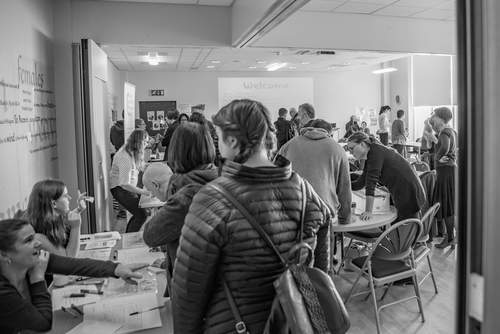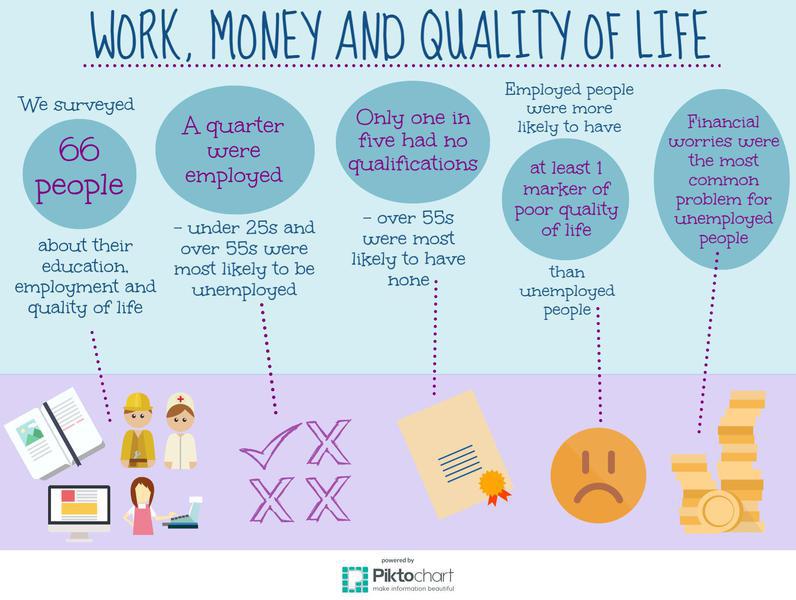
How does work affect your quality of life and health?
As part of our project, exploring neighbourhood change, over 30 people from across Glasgow took part in the Activate community development course. As part of the course, participants got into groups to carry out a community investigation – a research project into a topic that interested them.
In this blog, members of one of the research groups, Chris, Luda and Sheena, describe their project, in which they asked “Does having a job or not having a job affect quality of life and health?”.
Chris
I work within a local charity in the East end of Glasgow, which supports all local tenants of all ages with welfare, benefit, employment and housing needs.
I joined the Activate group as I was interested in the ethos of the research project, which is looking into the health and poverty effects on local people in the east end area and the city of Glasgow, to gain a realistic and current view of the lives of people in the most impoverished areas of the city.
As part of the research project, we devised a questionnaire to gather relevant responses that would give us indications as to how people felt, whether they were or weren’t in employment.
We divided the responses we got into male/female and into four age groups: 18-25, 26-40, 41-55 and over 55s. We looked at how people described their own quality of life, based on whether they were in employment or not and how long they’d been in that situation.
We asked them, on a scale of 1-10 (1 being lowest and 10 being highest), how they felt about things like their mental health, physical health, self-esteem and other aspects of quality of life.

Luda
What our study found was that the lowest rate of employment was among the 18-25 age group. Perhaps this can be attributed to a lack of work experience and qualifications. However, it must be noted that the sample size for this category was also the lowest, so to increase reliability it would be important to repeat this study and have a larger number of participants involved.
During our questionnaire we also decided to find out whether there was a correlation between people being employed and unemployed and whether they had children who were under 16 living with them.
We found that the 29 out of 66 of our participants were unemployed without children under 16 living with them. This could be due to a variety of reasons, e.g. divorce, or perhaps not feeling they could afford to have children in the first place. So we cannot really deduce anything from this data without collecting further information.
Our next question for our participants was whether they had gained qualifications to at least a school leavers' level, and whether this had any impact on their success in finding a job. Surprisingly, we found that 50% of our participants in fact had qualifications but were unemployed. Some of our participants even had qualifications at university level but were unemployed.
Finally, in our questionnaire we asked our participants to indicate, on a scale of 1-10, how they were feeling regarding a variety of factors in their lives.
The most obvious difference found in our study for the 26-40 age range was the difference in financial situations between employed and unemployed people – employed people had more money. But what was surprising was that, in all of the other age categories, most aspects of quality of life we asked about did not differ greatly between employed and unemployed people. For example poor mental health affected employed and unemployed people almost equally.
Sheena
Originally I choose this topic as I have been both unemployed and employed and I know how I coped, when I was unemployed and my health suffered, so I wanted to see if this is a general thing or just me.
I liked that the people that I spoke to were open and told me the true impact their employment status had on their lives.
To be honest, I was surprised at the outcomes. My own part of this study showed that it didn't matter if you have a job or not, we still have mental health issues, money problems, as well as struggling with everyday family issues.
I really enjoyed taking part in this project and who knows what might happen in the future, perhaps a follow up study?
Learning from the research
So, Chris, Luda and Sheena’s project compared the quality of life of people in work and people out of work. The results surprised them, because they found that many people in work struggled with money, their mental health and quality of life. In many cases, it was just as difficult for people working as those who were not. Some of the people who took part in the survey found the low level of pay, the stress of their job and not getting time to spend with their family really difficult if they were in work. This shows that getting into work is not the end of the story – people need good quality, well paid and rewarding work for it to have a positive impact on their health and wellbeing.
All of those who took part in the Activate course are currently working on what they’d like to do next. This may be more research or some work to help support those experiencing issues their projects discovered. If you’d like to know more about this work, the Activate course or the neighbourhood change research project, please get in touch.
